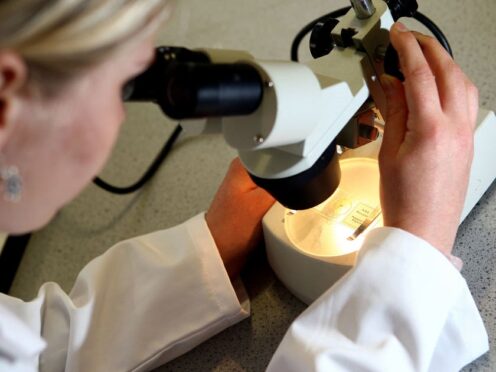
Thousands of people with a genetic condition that increases their risk of developing certain cancers will be offered preventative screening on the NHS.
Lynch syndrome impacts about 175,000 people in England but only 5% of those with the inherited condition know they have it.
It increases the risk of several types of cancer, including bowel, pancreatic and ovarian.
According to the NHS, about 1,100 bowel cancer cases in England are caused by Lynch syndrome.
People with the condition will now be invited for bowel screening every two years in a bid to detect the disease in earlier stages.
Steve Russell, national director of screening and vaccinations for the NHS, said: “Our successful bowel cancer screening programme already helps identify thousands of cancers each year, and now thousands more people who have been diagnosed with Lynch syndrome will also be given regular colonoscopies to check for signs of cancer and to detect the disease earlier.
“Ensuring people who we know are at a greater risk of developing cancers get regular screening is key to diagnosing cancers at an earlier stage, and I’d encourage everyone invited to come forward and get their screening at a local centre near them.”
About 10,000 people in England are on the Lynch syndrome register.
Nicola Theis, a university lecturer from Cheltenham, was told she has the condition after her dad’s diagnosis.
She said: “It all started when my dad was diagnosed with advanced bowel cancer in 2019 and only given months to live, which you can imagine was devastating for our family.
“I’d researched the importance of genetics in finding the most appropriate treatment options and after his results confirmed his cancer was linked to Lynch syndrome, he began receiving immunotherapy and incredibly this treatment began to shrink his tumour.
“Miraculously, he was cancer free in less than a year and his scans have been clear since. I’m so happy he’s still with us.”
Genevieve Edwards, chief executive at Bowel Cancer UK, said the charity expects “to see a vast improvement in the experience and outcomes for people with the condition”.
“Those who have been diagnosed with Lynch syndrome will now have regular access to high-quality colonoscopy tests regardless of where they live in England,” she added.
“As the first country in the world to implement a programme like this, we are leading the way in improving the care of people with Lynch syndrome and ultimately saving lives.”
The move comes almost a year after the health service started rolling out a genetic test for Lynch syndrome.
From April 2023, those diagnosed with bowel and endometrial cancer are offered genomic testing, which studies DNA, helping them to receive more personalised treatment.
Dr Robert Logan, NHS England’s national speciality adviser for endoscopy and bowel screening, said bowel screening is “great news for patients”.
“Not only has genetic testing for the condition increased massively in less than five years, but we are also ensuring that patients diagnosed with Lynch syndrome are then guaranteed to get the high quality surveillance colonoscopy they need from the national screening programme.”

Enjoy the convenience of having The Sunday Post delivered as a digital ePaper straight to your smartphone, tablet or computer.
Subscribe for only £5.49 a month and enjoy all the benefits of the printed paper as a digital replica.
Subscribe